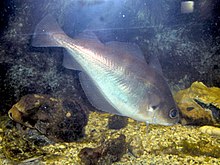bio.wikisort.org - Animal
Trisopterus luscus (Latin pronunciation: [ˈtrisopterus ˈluskus]; bib, pout whiting, pout or most commonly pouting) is a seafish belonging to the cod family (Gadidae).
| Trisopterus luscus | |
|---|---|
 | |
 | |
Conservation status | |
| Scientific classification | |
| Kingdom: | Animalia |
| Phylum: | Chordata |
| Class: | Actinopterygii |
| Order: | Gadiformes |
| Family: | Gadidae |
| Genus: | Trisopterus |
| Species: | T. luscus |
| Binomial name | |
| Trisopterus luscus (Linnaeus, 1758) | |
| Synonyms | |
|
Gadus luscus Linnaeus, 1758 | |
Distribution, size and life cycle
Pouting are found predominantly in European waters, especially around the south and west of the British Isles and in Scandinavian waters, although they can also be found in the Mediterranean and along the north African coast.[2] They can be found across rocky and sandy seabeds with smaller specimens being found close to the shore and larger pouting being moving further offshore. The greatest depths at which pouting can be found is 300 metres.[3] Pouting are generally a small fish, seldom exceeding 30 centimetres in length, although rare specimens can reach almost double this length. Pouting can reproduce before they reach two years of age and grow rapidly, reaching around 15 centimetres in length by the end of their first year. Pouting are a relatively short lived species, with the average lifespan thought to be around four years.[4]
Feeding and diet
Pouting are scavengers which feed on the seabed. They forage for any food source they can find with marine worms, shellfish and dead fish all making up their diet.[4] Due to their small size pouting are a source of prey for large species such as cod, bass and conger eels.
Commercial value
Pouting were previously ignored as a commercial fish, with pouting that were inadvertently caught by trawlers being either discarded at sea or processed into fishmeal.[4] Captured pouting are unlikely to survive when discarded.[5] However, the decline in the stocks of whitefish species such as cod and haddock has seen pouting acquire a growing value as a commercial fish,[4] and they are now available both as whole fish from fishmongers and supermarkets and are also used in fish products such as fish fingers and ready meals. Due to their naturally short lifespan and early breeding age pouting are seen as a relatively sustainable fish to eat.[6]
References
- Di Natale, A.; Molinari, A.; Őztűrk, B. & Srour, A. (2011). "Trisopterus luscus". IUCN Red List of Threatened Species. 2011: e.T198587A9042469.
- "Trisopterus luscus". FishBase. Retrieved 5 January 2017.
- "Bib or Pouting, Trisopterus luscus". MarLIN - The Marine Life Information Network. Retrieved 5 January 2017.
- "Pouting". British Sea Fishing. September 2012. Retrieved 5 January 2017.
- Depestele, J.; Desender, M.; Benoît, H. P.; Polet, H.; Vincx, M. (2014). "Short-term survival of discarded target fish and non-target invertebrate species in the "eurocutter" beam trawl fishery of the southern North Sea". Fisheries Research. 154: 82–92. doi:10.1016/j.fishres.2014.01.018.
- "Pouting or Bib". Good Fish Guide. Marine Conservation Society. Archived from the original on 14 July 2014. Retrieved 1 July 2014.
External links
 Media related to Trisopterus luscus at Wikimedia Commons
Media related to Trisopterus luscus at Wikimedia Commons
На других языках
- [en] Trisopterus luscus
[es] Trisopterus luscus
Faneca (Trisopterus luscus) es un pez de la familia Gadidae, a la que pertenecen también el bacalao (Gadus morhua). Se puede encontrar a lo largo de la costa europea. Normalmente crece hasta los 30 cm.[ru] Французская тресочка
Французская тресочка, или люска[2] (лат. Trisopterus luscus), — вид морских лучепёрых рыб из семейства тресковых. Распространены в восточной части Атлантического океана. Морские бентопелагические рыбы. Максимальная длина тела 46 см.Другой контент может иметь иную лицензию. Перед использованием материалов сайта WikiSort.org внимательно изучите правила лицензирования конкретных элементов наполнения сайта.
WikiSort.org - проект по пересортировке и дополнению контента Википедии
